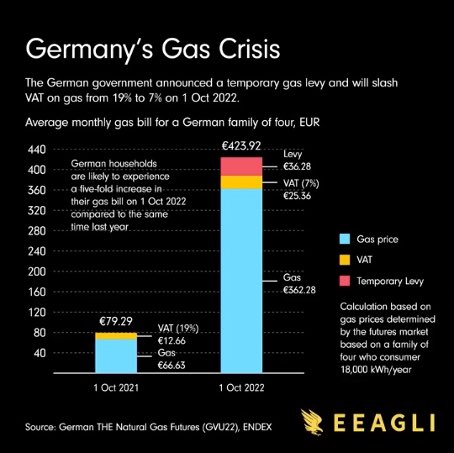
By the end of this week, the school holidays end in 11 of Germany’s 16 federal states. For readers from abroad, here’s a layman’s take on the political mood in Germany as the summer lull draws to a close. [1/9]
Two issues are on most people’s mind. First, the massive rise in energy prices, mainly caused by curbed gas supplies from Russia – @JamesEagle17 has aptly illustrated the consequences on German households (on LinkedIn, linkedin.com/posts/jameseag…). [2/9] 

For now, there’s just an eerie feeling that something is wrong. The water in public swimming pools is colder (nytimes.com/2022/07/29/wor…) and politicians are asking people to use wash cloths. But most will only feel the hit to their disposable income in a couple of months. [3/9]
Second, it’s visible to everyone that Germany is facing the worst drought on record. The river Rhine has dried up (p.dw.com/p/4FeaH), lush gardens are turning into steppes, and it is becoming increasingly difficult to ignore the consequences of climate change. [4/9] 

According to the latest #Politbarometer poll, 40 percent of respondents expect their own economic situation to worsen in the coming year – this is apparently the highest proportion of pessimistic responses since this monthly survey began in 1977 (zdf.de/nachrichten/po…). [5/9] 

So how should policymakers react? 71% of respondents to the #politbarometer survey want Germany to continue to support Ukraine, even if this entails income losses due to high energy prices. This view is shared across the political spectrum, except for AfD supporters. [6/9] 

Instead of bowing to Russia, 93% of respondents want a faster expansion of renewables and 65% want to continue using nuclear power plants beyond their planned closure. The shift in sentiment towards nuclear is shared by many Green Party supporters (spiegel.de/international/…). [7/9]
The Greens now enjoy record support for their handling of the gas crisis and their policies against the climate crisis, while support for the liberal @fdp has dropped, b/c it is seen as less competent and as an obstacle to fair burden sharing.
https://twitter.com/pollofpolls_EU/status/1561707896567730180[8/9]
In summary, most Germans see a recession coming b/c of high energy prices (
https://twitter.com/RobinBrooksIIF/status/1561728483184857088), but polls show that they’re willing to take it on the chin rather than give in to Russia. Germany also want a faster green transition in response to the climate crisis. [9/9]
• • •
Missing some Tweet in this thread? You can try to
force a refresh






